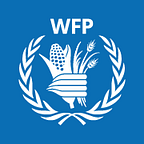Colombia: Food brings relief to flood-affected communities
A few months after the great flood in La Mojana region, local people begin their recovery
The rupture of a dike on the Cauca River in August 2021 caused massive floods that destroyed the livelihoods of the most vulnerable people in the Mojana region, who are smallholder farmers and fisher people.
In addition to submerging land and crops, the flood also submerged the community’s agricultural tools and traditional fishing gear of those engaged in artisanal fishing. These economic losses were significant for people like Maricelda and Lennis.
In response to this emergency, the World Food Programme (WFP), with the support of the Humanitarian Aid and Civil Protection Agency of the European Commission (ECHO), provided food assistance to those affected in La Mojana.
Maricelda, a lifelong farmer
The flood caused Maricelda and her family to lose their crops which affected their economy and food security.
Shortly after the emergency began, Maricelda and her family received assistance from WFP. With the lentils and beans that she received, Maricelda prepared stews, rice dishes and fritters. “I didn’t waste anything and my family likes how I prepare them,” she explained.
After the emergency, Maricelda returned to agriculture and today she grows corn and cassava. The next harvest will be an emotional release for her as she can begin her economic recovery.
The fishermen and peasants of Caimito
The organization of fishermen and peasants of Caimito was also hit by the floods. It is made up of 23 families from the town of Caimito that have collectively kept their production active despite the challenges. Through the delivery of humanitarian assistance over four months by WFP, the organization can now count on 20,000 cachamas (a type of fish) that generate income for several households.
Tree recovery
Finally, in one of the most affected towns, El Cuchillo, a group of women have contributed to the recovery of the native trees and the biodiversity of La Mojana.
One of these women, Lennis, is a social leader of El Cuchillo. She notes that, to this day, they are still affected by the August 2021 flood since many neighbours have left the town. Raising animals and maintaining their food crops has been difficult.
“However, thanks to the help of the WFP we have been able to sustain ourselves and, without this help, we would be at risk of contracting different diseases,” she added.
Lennis mentioned that the association she leads (made up of 23 women and one man), is developing a program for the restoration and conservation of native trees and seeds. “We want to do our part in the recovery of the biodiversity and ecosystems of La Mojana,” she added.
She focuses the association’s work on recovering from floods through small actions such as recycling, planting trees, avoiding the use of agrochemicals, and taking care of the water to help mitigate pollution and curb the climate crisis.
In general, WFP’s food assistance was possible thanks to the support of ECHO, which led to the recovery of Maricelda, the fishermen and farmers of Caimito, Lennis, the women’s organization, and other inhabitants of La Mojana affected by the floods.
